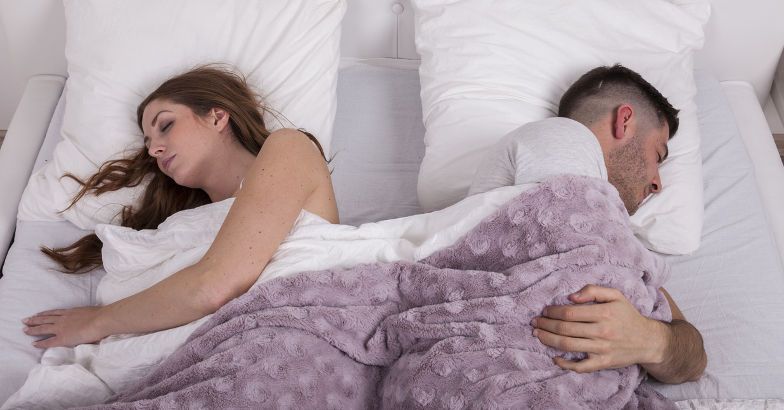In the beginning, it was super hot. So, why does good sex so often fade, even for couples who continue to love each other as much as they ever did? And why does emotional intimacy not guarantee great sex? Why does the arrival of children – or even just one baby -- so often strike a fatal erotic blow?
It’s something that isn’t much talked about – the crisis of sexual desire that cuts a global swathe. It has fuelled overwrought, fevered research into drugs to enhance the libidinal urge, and an online shopping frenzy in Aphrodite’s pharmacy for new sexual thrills. But, while drugs and other medical treatments have their place, the problem of libidos migrating from the lull to the dull is too complex and nebulous for medical science to provide all the answers.
What’s it all about?
While it is generally assumed that we all know what we are talking about when we use the term, “sexual desire”, it is actually an intricate concept that involves a labyrinth of interacting factors, including a person’s biological drive to pursue sex, his worldview (a.k.a. personality), culture, religion, social norms (such as what is considered appropriate sexual behaviour), myths about sexuality, prior knowledge and experience of sex, and the motivation to act on sexual urges.
In addition to all these multiple factors determining sexual desire, there is the added complexity of the corresponding sexuality of your partner. The expression of your sexuality is intimately related to your partner’s sexuality.
We do know that the activity of different parts of the brain is involved in producing desire; but no one has yet carried out the reverse engineering that would fully answer the question of how desire is produced in the first place. We do know a lot, however, about the reasons behind the decline or absence of desire. At one level, studies confirm what has, in fact, been general knowledge all along – namely, that desire tends to diminish in the context of a long-term relationship. The simplistic reasoning is that monogamy spells monotony, and that sexual boredom explains it all.
But more in-depth thinking has also been at work in looking at the question of why desire is difficult to sustain in a committed relationship, and what can be done to boost it. It has been suggested that the difficulty arises from our striving, in a long-term relationship, to satisfy two very different – perhaps conflicting -- needs. On the one hand, we want commitment, togetherness, security, predictability, dependability, permanence. We want this anchoring in our lives. On the other hand, we have an equally strong need for novelty, for mystery, for adventure, for surprise, for transcendence and awe. And that cannot be supplied for any meaningful period of time with sex toys, lingerie or a gold pendant for a Valentine’s Day gift.
Revving up your sex drive
 Photo: Getty Images
Photo: Getty ImagesAsked specifically when they feel most drawn to their partners, people in a long-term relationship have said it is when the partner is away, when they are apart. We imagine ourselves re-uniting with our partner, there is a longing rooted in absence; and anticipation, of course, is the mortar to desire. In other words, absence does make the heart grow fonder, and the libido stronger.
Also reported as a major turn-on was seeing the partner when he was in his element in the production studio, when she was on stage doing something she is passionate about, when he’s the life of the party, when she’s holding court as she enacts a mimicry of public figures. In other words, when you see your partner looking confident, self-assured, proficient. And he or she is just a small distance across from you. This is a person who is already so familiar, but you’re seeing him or her, for that while, appearing again somewhat mysterious, somewhat elusive. As Proust said, mystery is sometimes not about new places, but about looking with new eyes. There is a momentary shift in perception when you see your partner enveloped in this self-sustaining elan and, in a committed relationship, it can be a big turn-on.
The third route to keeping libido in fine fettle in a long-term relationship is to keep the novelty alive. But novelty is not just about new positions during sex, or a repertoire of different techniques. It’s about bringing to the sexual experience new parts of yourself. Because there are so many facets of yourself that you can bring into play when you enter that space we call ‘sex’: it can be a space for transcendence and spiritual union; a place for naughtiness; a place where you can be safely aggressive, a space where you can express even your infantile urges; where you can finally surrender. It’s an erotic space where you stop being the “responsible” adult that you are in the world without. In order to keep sexual desire alive, it is important to keep bringing to that place all those “uppers” – imagination, playfulness, novelty, curiosity, mystery. It could be something as simple as a candle-light dinner at home, or a holiday abroad. Or it could be something more wildly exciting, even experimental. If you and your partner are being dynamic in your love life, then it’s as if you’re not having sex with the same person all the time.
Re-booting the system
 Photo: Getty Images
Photo: Getty ImagesAll that said, it is also true that there are a myriad other things in the real world that can often run interference with sexual desire. These are sometimes turn-offs that come into play as a consequence of a health problem you’re having – or from a medication you’re taking for that health problem. Other turn-offs come into play when you’re feeling dead inside, when you don’t like your body, when you feel old, when you haven’t had the “me” time you need, when things are not going well at work, when you have a low sense of self-worth, when you feel you don’t have the right to want, to take, to receive pleasure.
If you’re feeling less sexual desire than you would like to, consider the questions, below, and your answers to them:
Are you having relationship issues?
 Photo: Getty Images
Photo: Getty ImagesLow sexual desire can be a barometer of the emotional health of the relationship. Negative mental states – whether anger, anxiety, stress, grief or depression – can cause sexual desire to plummet, and affect the relationship as a whole. For instance, if you are habitually angry with your partner over one thing or another, your libido can do a very good vanishing act.
Do you have any health problems?
 Photo: Getty Images
Photo: Getty ImagesCardiovascular problems such as high blood pressure, poor blood circulation or having had a stroke can put off both partners from having sex, the fear of a heart attack or another stroke effectively pulling the plug on desire.
A number of neurological conditions (most commonly Parkinson’s disease, stroke, prolapsed disc and spinal injury) can cause changes in the brain or damage to the spinal tract which can reduce the ability for sexual arousal, erection and ejaculation; these dysfunctions can, in turn, deflate the sex drive.
Certain mental disorders may also affect sexual desire. Depression is a well-known libido squasher. Those suffering from eating disorders like anorexia nervosa also report increased sexual anxiety and decreased sexual desire. One major reason is the negative body image and self-concept associated with these disorders. But there are also physical factors that contribute to the low sex drive. Research shows that poor nutrition and low body weight due to food restriction or purging have a direct impact on the production of sex hormones. For example, healthy fats are necessary for the production of estrogen and testosterone, both of which are linked to libido.
What medications are you currently taking?
 Photo: Getty Images
Photo: Getty ImagesMany commonly used drugs decrease sexual desire, and very few doctors will mention that side-effect. Certain anti-depressants are notorious culprits. They elevate mood, but many of them (including the most popular ones today) can simultaneously lower libido.
Among the miscellany of other drugs that drag down desire are medications used to treat blood pressure; elevated cholesterol levels; seizures; fungal infections; enlarged prostate; allergies (e.g., over-the-counter antihistamines).
But the sexual side-effects of drugs are highly individual; not all users are fated to suffer them.
Do you drink alcohol? If so, how much? How often?
 Photo: Getty Images
Photo: Getty ImagesThe link between alcohol and sexual desire is a complex one, and depends on several factors such as the amount of alcohol, as well as a person’s expectations about what the alcohol will do to their sex drive. In terms of dose, research suggests there may be an optimal amount of alcohol that will induce positive effects on sexual arousal and performance. But there is abundant anecdotal as well as scientific evidence that supports the notion that too much alcohol is a passion killer. One strong confirmation comes from the bi-phasic nature of alcohol: it has stimulant effects as blood alcohol concentration increases, but depressant effects as it decreases again.
Does your partner have a chronic, disabling illness?
If your partner has a disease like Parkinson’s or a spinal cord injury, your own sex drive can also be impacted. The kind of issues that may arise include:
» Fatigue and resentment over having to take on added responsibilities.
» Dealing with your own feelings relating to your partner’s diagnosis (e.g., fear, anxiety, depression).
» Loss of sexual attraction and interest in your partner due to the disabling symptoms of the illness, e.g., involuntary movements or the lack of facial expression in Parkinson’s, or the urinary incontinence that can occur in the case of enlarged prostate.
Are you an older adult?
 Photo: Getty Images
Photo: Getty ImagesSociety often stereotypes seniors, viewing them as “too old” to have sex or even be interested in it. In fact, the very notion of older couples having sex has been a taboo subject until recent times. The unspoken dictum was: Older women “did not” and older men “could not”.
While there is no de facto reason why you should not continue to have sex way into your 70s and 80s, it is true that desire is not as compelling or urgent as in a younger person. There is also a natural and gradual fall in the level of the male sex hormone, testosterone, so that, by the time a man is 60, he has about two-thirds of the testosterone he had as a 20-year old. Even with this natural drop in testosterone levels, men can manage sexual activity very satisfactorily. It is only a more rapid fall (at any age, actually), that can cause a syndrome of symptoms, including libido loss.
Other changes in sexual function (e.g, impotence, a decline in the amount of ejaculate, less acute pleasure in getting to the peak of orgasm and ejaculation, painful ejaculation following prostate surgery) can also be upsetting and thereby squelch sexual ardour.
In women, menopause can sometimes cause sexual interest to wane, but sometimes it can have the opposite effect: that is, many women experience a surge in sexual interest when their periods cease and they do not have to fear the likelihood of pregnancy.
On the other hand, changes in the body that occur with menopause (e.g., smaller, less firm breasts) can make a woman feel less desirable, causing a loss of sexual confidence and self-esteem.
About 40 % of women are estimated to experience a decline in libido following the onset of menopause and lowered levels of the hormones involved in sexual arousal.
In addition, in both, men and women, if there are problems of reduced mobility, arthritic pain, incontinence, obesity or personality changes, these and several other health conditions can further put the brakes on desire.
Re-kindling the flames
 Photo: Getty Images
Photo: Getty ImagesYou are not helpless in the face of difficulties or challenges to your sexual drive. Here are some routes to restoring the erotic charge in your relationship:
Talk to your partner. Most people experiencing a reduced sexual desire are hesitant to bring up their concerns and fears with their partner. But, talking about a problem is the first step to resolving it. If you feel you need help on this, reach out to a marriage / sex counsellor. The nose-diving of your libido may, in fact, provide you and your partner with the opportunity to re-define sexual intimacy in your relationship – in many ways, for the better. But only if you allow it to!
 Photo: Getty Images
Photo: Getty ImagesIf your own libido is being dampened by a diminished sexual desire that you see in your partner, and if you’re wondering how to begin talking about it, you might start by sharing with your partner how you feel, and asking how your partner feels. For example, say: "I get the feeling you don’t want to make love to me any more, and I wondered how you feel about that." Then listen to what your partner says. If he’s upset, give him space to think, and come back to the discussion another time. Reassure your partner that you love him and enjoy being close to him. Avoid accusatory “You always...” barbs. Prefer “I” statements – e.g., “I think my body responds better when...”
Don’t ignore the vital importance of novelty. Even if you think you know what you like when it comes to sex, it’s worth exploring a bit more. Ask yourself what you might like more – or less – of, and what else you can give to your partner.
If your partner has a lower (or higher) sex drive than you do, you can work out together how to manage those disparate levels of libido within the relationship. The partner with a lower sex drive might still want to be close to her partner and to share pleasure with him, but may not feel like having intercourse so often. She may however be happy to give and receive other forms of sexual intimacy, such as kissing and cuddling. People often worry that their partner might assume a hug means “I want sex”. But if you agree that a hug is just a hug, you can enjoy non-sexual physical contact simply for what it is.
Discuss your medications with your doctor. If you find that diminished sexual desire is one of the side-effects of your medication(s), talk to your doctor about it. It may be possible to substitute a different drug, to lower the dosage, or to tack on another drug that will counteract the desire-zapping effects of your medication.
In the case of some drugs (e.g., certain anti-depressants), all you may need is a little patience, as their side-effects on sexuality tend to go away after a period of usage.
Another approach to the problem is as simple as tweaking the time that you take your medication. For instance, the side-effects of many over-the-counter antihistamines do not last 24 hours; in the case of younger, healthy persons, they generally clear up in about 8 hours.
You may have other options if your medication is the culprit. One study on women taking a libido-suppressing anti-depressant found that those who started on an exercise programme (cardio and strength training) saw improvements in the bedroom.
Give your libido a chemical boost. Today, we do have specific drugs to enhance sexual desire. Hello again, Viagra. This erectile dysfunction drug has been found, over time, to improve overall sexual satisfaction, including sexual desire. The so-called “female Viagra” is also here.
Unfortunately, most people are too embarrassed to bring up the subject of their sexual activity with a doctor, and most doctors are also uncomfortable about bringing it up. But it’s a matter of redeeming your sex life, and you may need to be proactive about this. Muster up the spunk and bring up the subject yourself, explaining to the doctor what you are experiencing. If you find the doctor is dismissive – or embarrassed – look for another physician who will respond matter-of-factly to your concerns.
Senior sex may call for some creativity. Despite the difficulties and challenges that the passing of the years may bring, do not buy into the myth that it’s all a downhill ride of waning sex drive and dried-up hormones.
If you’re a candidate for it, hormone replacement therapy can help. (However, there is an ongoing re-think in scientific and medical circles about the efficacy of testosterone therapy for women).
In the case of disabling problems like arthritis, back pain and other joint or muscle disorders, the remedies can be as simple as experimenting to find more comfortable sexual positions, using microwaveable heated pads around sore joints, and careful timing of pain-killers.
A shift in mindset is vital. Being sexually active does not mean that penetrative sex must occur every time. As you grow older, a satisfying sex life becomes less aimed at getting an erection or an orgasm, and more a matter of sharing sexual intimacy and affection. Keep in mind that it’s not about getting back to the way things were when you were younger. It’s about finding out what works for both of you now. In fact, the senior years – with more time and fewer distractions – can be a time of creative pleasure. There is a whole range of sexual activity that can be indulged in, which can be highly satisfying. It is about thinking and feeling sexy, as well as allowing yourself to behave in a sexual way (cuddles, kisses, touching, feeling desired and accepted, and so on).
Unfortunately, many older adults still consider talking about sex as taboo. Although, to start with, you may feel uncomfortable, once you do make a start, you will probably find that it gets easier. In fact, you may find that just talking about sex can make you feel sexy.
(The author is a former editor of 'Health & Nutrition' magazine, and now works as a counseling therapist)


























 Photo: Getty Images
Photo: Getty Images